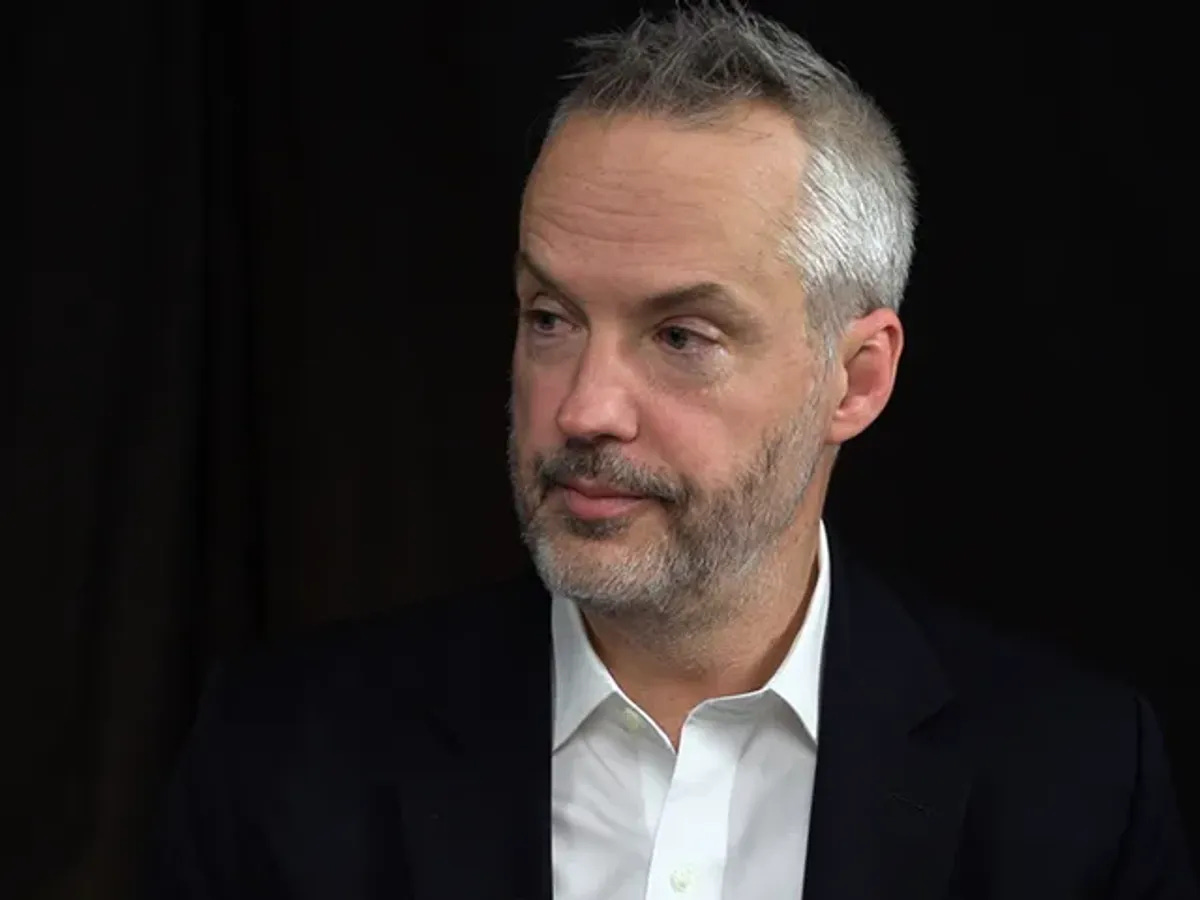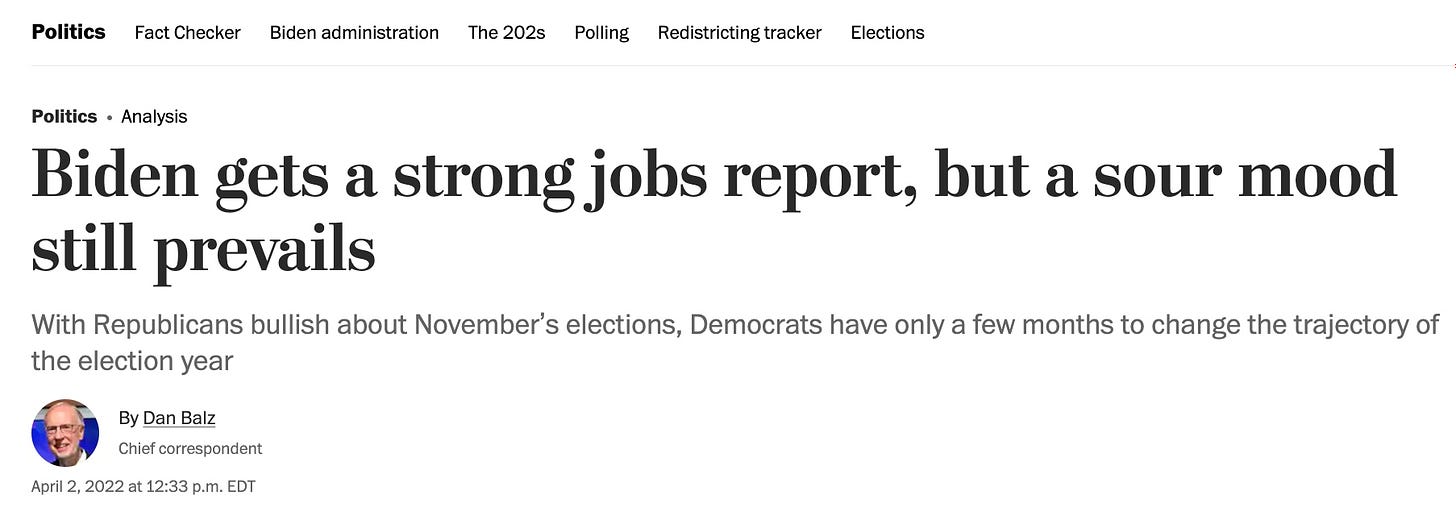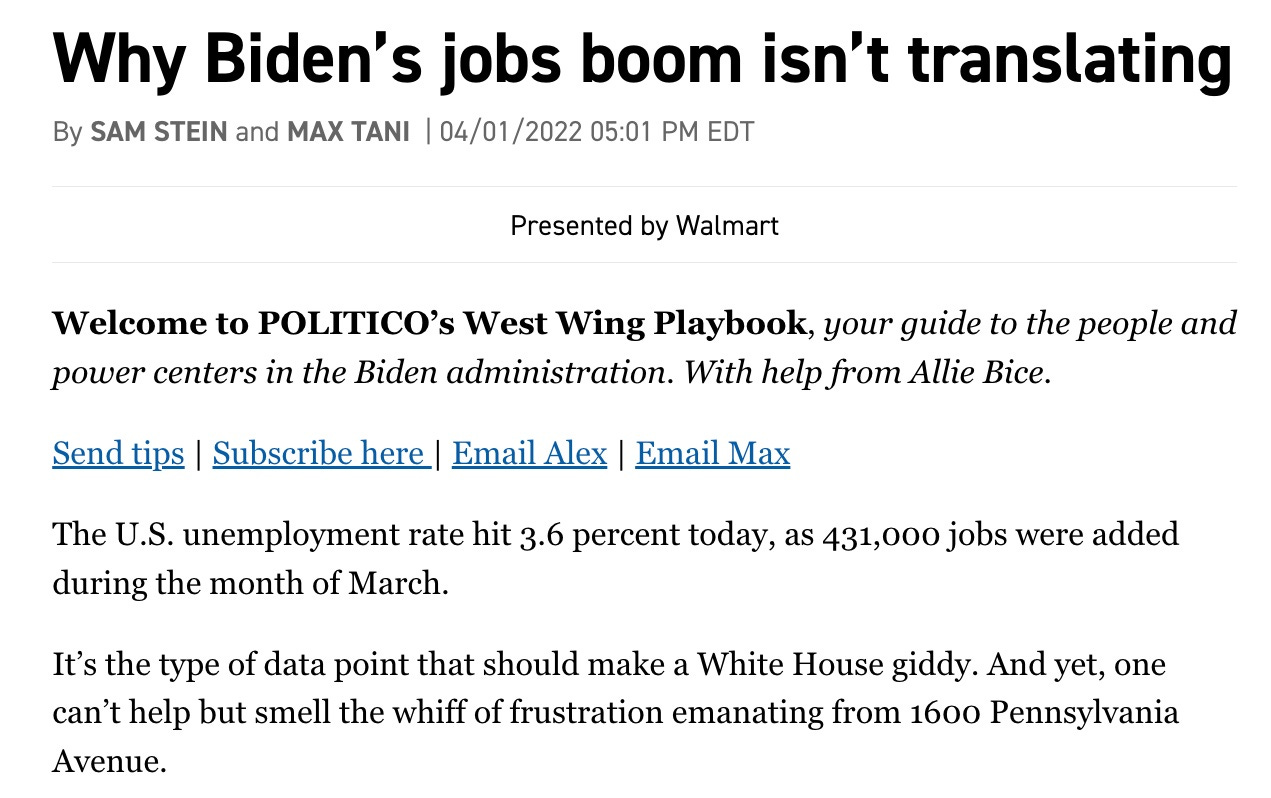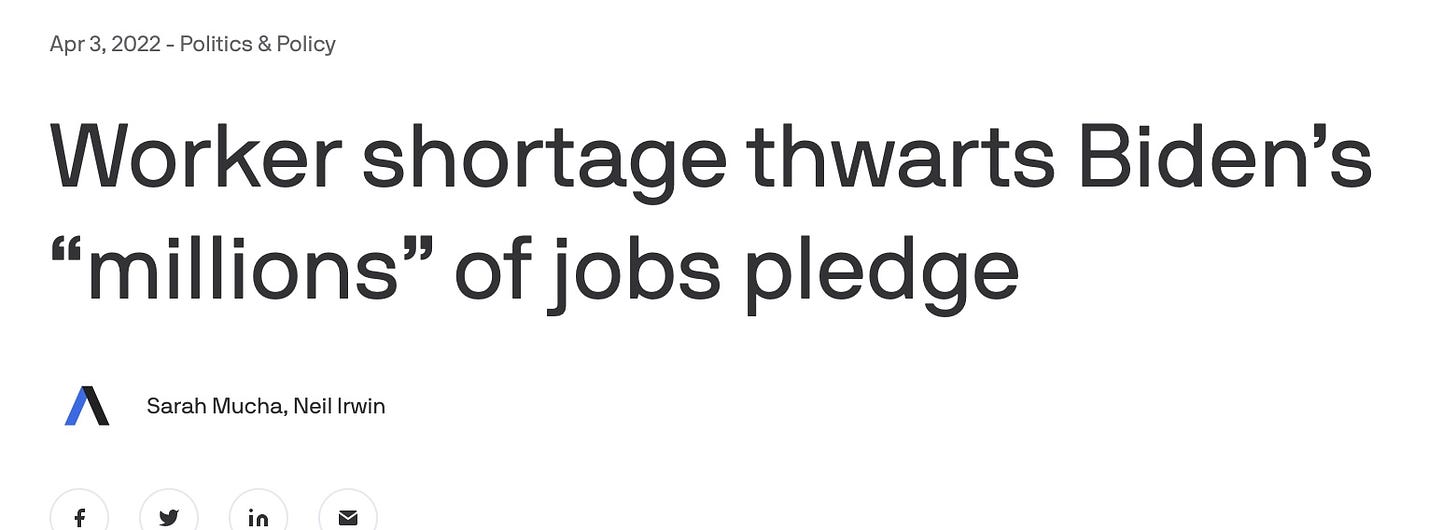Framing: In Honor of Eric Boehlert.
We have lost a crucially incisive voice, and a kind and generous person. Here is an attempt to continue in his spirit.

I just got the news this afternoon that Eric Boehlert, author of the popular Press Run site on Substack, had died in a bicycle accident in New Jersey, at age 56. This is heartbreaking and terrible. I send my condolences, sorrow, and support to his wife, Tracy Breslin, and their children, Jane and Ben.
I had met Eric only once in “real life.” But I corresponded with him with increasing frequency over the years, especially this past year, and considered him a conscience and inspiration. He was fearless and absolutely unsparing in his writing about this era’s mainstream press. I am so sorry for him, and for his family, and for all of us to have lost his courage and voice.
I had been working on today’s item anyway. But I have Eric Boehlert in my mind as I finish writing this now, and as I plan for future dispatches. Others will have to make up for his absence.
This post will be about a few of the “framing” habits of the mainstream press that have become increasingly obvious and destructive. It follows these previous items on framing: “A Word the Press Should Remember,” “Framing the News: an Update”; and “Journalism Needs to Engage with its Critics.”
The point of all of those, and of my Breaking the News book more than 25 years ago, was that the unspoken assumptions the media brings to coverage usually matter more than blatant expressions of bias.
This means, for example: the press’s assumption that the most interesting aspect of any development is the politics of it—“What does this mean for the midterms?” “Are the Democrats in disarray?” “Who can out-Trump Trump?” Or that you could best present the truth of an issue by quoting both a Republican and then a Democrat, or better yet having them argue on screen. Or that “positive” news about social developments or government functionality should be approached with great caution. At best it could seem boring, and at worst it could make you look like a sucker if something later went wrong. Or—on down a long list, which you’ll see in those preceding posts, and that Eric Boehlert chronicled in tireless detail, including his final post here.
Here are several additional examples of framing assumptions to watch for in the mainstream news. When you see or hear stories based on these premises, move on to something else.
1) The best description of an economy, is what makes it look worst.
Late last year I wrote about the difference between two economic perils, unemployment and inflation. Both are bad, and each can eat into a family’s security and a society’s cohesion.
But of the two, one is incomparably worse. If you lived through the Great Depression, as my parents did, you knew that a family without work or income is more desperate than a family that “pays more at the pump” when gas prices rise. My mother and her two brothers were farmed out to relatives in the 1930s, when their widowed mother could not support them. That was worse than anything inflation did to them decades later when they had families of their own.
If you’ve seen the ups and downs of the American economy over the past half-century, as I have, you know that angry times are when prices go up—but hopeless times are when businesses shut down.
No government (or society) wants either problem. But at the moment the U.S. economy suffers from one of them, inflation—as does most of the rest of the world. But it is being resoundingly successful on the other front, employment levels. Based on the latest job-creation report, unemployment is at its lowest since before the pandemic; hiring is at its strongest in many decades; and the challenges of staff-shortage, wage pressure, and “Great Resignation” all reflect an economy strong enough to give individual workers a broader range of choice.
It’s a mixed good-and-bad reality, both related to very fast growth. But the press framing has been overwhelmingly negative. As Eric Boehlert, Dan Froomkin, and others have pointed out, for each mention in the mainstream press of hiring levels, there have been about ten times as many stories on inflation—and people think the country has lost rather than dramatically gained jobs on Biden’s watch.
Consider a few headlines after the latest very strong job data.
From the Washington Post:
From Politico:
From CNN:
And from Axios, in a real quadruple-salchow of finding the negative spin:
Of course in the long run reality drives political perception, more than press coverage does. And of course inflation, worker shortages, and other aspects of a fast-growing economy are genuine problems, which people react to in both logical and emotional ways.
But relentless coverage of urban crime is one reason Americans have grown more fearful of it, even as rates of crime have gone down. The mainstream framing of economic news may have a similar effect. The framing is: Things are worse than you think, worse than your own experience tells you. Then political analysts come in to tell us: Somehow people are feeling bad, even when trends are good. Media framing is not the whole explanation, but it’s a part.
2) ‘Being Independent Boils Down to Acting Hostile.’
Back in the 1990s, I wrote the passage below in an Atlantic cover story drawn from Breaking the News. It was about the kabuki of White House press conferences, in which reporters signaled their independence of thought through performative rudeness on camera. For those who were around in those days: think of ABC’s Sam Donaldson, who now would seem like Socrates in the briefing room.
The story said:
When ordinary citizens have a chance to pose questions to political leaders, they rarely ask about the game of politics. They want to know how the reality of politics will affect them—through taxes, programs, scholarship funds, wars.
Journalists justify their intrusiveness and excesses by claiming that they are the public's representatives, asking the questions their fellow citizens would ask if they had the privilege of meeting with Presidents and senators. In fact they ask questions that only their fellow political professionals care about. And they often do so—as at the typical White House news conference—with a discourtesy and rancor that represent the public's views much less than they reflect the modern journalist's belief that being independent boils down to acting hostile.
Consider that as background to a question yesterday from Steven Portnoy of CBS, the current president of the White House Correspondents’ Association, to press secretary Jen Psaki. You can see the video in a tweet here or starting at time 21:25 of the C-Span full video here.
The gist of the exchange was Portnoy asking, “Why shouldn't the images of the atrocities from Bucha compel a worldwide, unified coalition kinetic response?” Kinetic being a Pentagon buzzword for “blowing things up.” He went on to ask, in effect, Why isn’t the U.S. leading a military effort against Putin? To which Psaki answered, patiently as always, that the U.S. policy was to support Ukraine in all ways short of direct military engagement against Russian troops, which Biden had ruled out from the start. The reason for that, in turn, was the grim reality of the nuclear era, and the unforeseeable risks of escalation.
I encourage you to watch the exchange yourself.
Some form of the underlying question is of course legitimate. Biden has said all along that U.S. forces will defend “every inch” of NATO territory, but otherwise will not engage Russian forces head-on. The question is: Can that policy hold up?
Biden’s current approach is the one adopted by every U.S. president in the decades since the Soviet Union acquired nuclear weapons. It is the one Dwight Eisenhower chose when Soviet tanks rolled into Budapest in 1956. It is the one John F. Kennedy chose when Soviet forces began building the Berlin Wall in 1961. It is the one Lyndon Johnson chose when Soviet tanks rolled into Prague in 1968. It is the one Barack Obama chose when Russian forces invaded Crimea in 2014. The only exception in modern times is Kennedy’s showdown with Nikita Khrushchev during the Cuban Missile Crisis of 1962. That brinkmanship apparently left both leaders so shaken that they began the negotiations which led to a nuclear test-ban treaty the following year.
The risk of nuclear escalation is the reality of our fallen time. It is the crude reality that aspirant nuclear powers recognize: The U.S. could invade Iraq, but it will never invade North Korea, because the Kim family has nuclear weapons and Saddam Hussein did not. It is what every spokesperson for this administration—Biden, Harris, Blinken, Austin, Sullivan, all of them, in every appearance—has said with undeviating consistency since the Russian assault on Ukraine began.
So a legitimate question for Biden’s administration could be: Now we’re seeing atrocities. Do these make a difference? Is there any line the Russians could cross that would change your policy? If so, what is it? And if not, why does it matter that Joe Biden now talks about Putin being a war criminal? What would it take? When might Biden make an exception, as John F. Kennedy did in 1962?
But watch the video, and see if that is how the question sounds to you. Or whether it sounds instead like “questions” at a Congressional hearing, where the Ted Cruzes and Josh Hawleys are looking less for a response than for a grabby on-air clip. The best interrogators I know—as teachers, editors, reporters, investigators, radio or talk-show hosts—have been the least dramatic and lowest key. But that is not the dynamic of a live-TV White House briefing room.
3. ‘The system is broken’ (but no one in particular broke it).
It is deeply uncomfortable for most in the press to say that one of our political parties has impeded public functioning. The unmatchably respectable AEI/Brookings scholars Norman Ornstein and Thomas Mann wrote a book ten years ago on this theme. Its title would still be hard for many anchors to read on air: “Let’s Just Say It; The Republicans Are the Problem.”
It is far more comfortable, and indeed thoughtful-seeming, to talk about the crisis of the “American system.” And in that mode it is additionally comfortable to keep channels open to “both sides.” To have them on your Sunday talk shows even if they voted against certifying the 2020 election results. To hire them as paid political “analysts” on your network, even if they were part of the behavior for which Donald Trump was impeached. (I am talking about Mick Mulvaney signing on with CBS, in a move Margaret Sullivan excoriates here.)
Thus we have stories about Clarence Thomas’s ongoing and gross conflicts-of-interest “balanced” with might-have-beens about Hunter Biden, who has never held public office. Thus did Ketanji Brown Jackson face “heated questioning” and “tough exchanges” in her confirmation hearing, rather than racist baiting.
4) We’re terrible at predictions. So let’s talk about the midterms!
Nearly every political professional foresaw Hillary Clinton’s victory in 2016. Very few of them foresaw that Raphael Warnock and Jon Ossoff would both win Senate seats in Georgia and give the Democrats control of the Senate last year.
None of them knows what will happen in this year’s midterms; or in the Republican primaries two years from now; or in the presidential election after that. Recall that eight months ago, the withdrawal from Afghanistan was going to be the “defining event” of Biden’s time in office and the hinge of modern history. But that doesn’t stop the “predictions market” on talk shows and in news-analysis pieces.
Sports betting is overall bad for society, but in the end it is accountable. People win or lose, and they have to pay up. Sports-betting sites keep track of the over/under record of their analysts.
The market in political-pundit predictions has no such moment of ruthless reckoning. If you were wrong about an election, then by definition there were last-minute “surprises” or “unexpected” fundamentals or turnout. Or you can pretend you never made the predictions at all. And if you were right, All hail! In either case, it’s on to the midterms—and after that, the primaries, and “will Biden run again?” and “can Trump come back?” Plus in all cases the “week in review” panels on TV and radio, and the “what lies ahead?” speaking engagements for corporate groups, and the “whither the Republicans?” thoughtful op-ed.
No one in the reading public, with the possible exception of paid consultants, is better off for any journalistic energy, whatsoever, being expended this way. Tell us what has happened, and what is happening, and why it matters. Don’t pretend to know what will occur, because none of us can be sure.
These are drawn from some of the things that Eric Boehlert has told us.
One thing I know, for sure, is that we will miss him.








Thank you for honoring Eric Boehlert today. I am (was?) a subscriber to his Press Run and appreciated his critical thinking and insights, as well as his "good stuff." I will miss him. Thank you.
I keep crying. It's as though a close friend has died. Eric's blog was the first one I ever signed up for, and it was because I got so frustrated from reading biased and poorly written journalism. There he was, reading my mind, who can resist that? What will we do without him, all of us loyal readers and commenters (and the comments were what made it all so special). Eric was a truth teller, a man with a keen lens through which he could see bias and dishonesty with 20/20 vision, yet he also treated us to his favorite music with every post.
Mr. Fallows, thank you for "framing" Eric in this kind, respectful post. We will always remember Eric Boehlert with love.